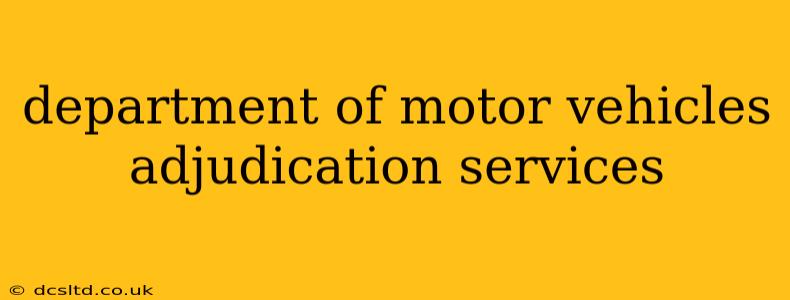The Department of Motor Vehicles (DMV) handles a vast array of services, and adjudication is a crucial, albeit often misunderstood, aspect. This process involves reviewing and resolving disputes, violations, and appeals related to driving records, licenses, and vehicle registrations. Understanding how DMV adjudication services work can save you time, money, and frustration. This comprehensive guide will delve into the intricacies of this often-complex system.
What are DMV Adjudication Services?
DMV adjudication services are the formal process used to review and decide on actions taken against drivers or vehicle owners. These actions can range from minor infractions like parking tickets to more serious offenses such as DUI or reckless driving. The adjudication process provides a formal platform to challenge decisions made by the DMV, present evidence, and potentially overturn or modify penalties. This is not simply an administrative appeal; it's a legally structured process with specific procedures and timelines that must be followed.
What types of cases are handled by DMV Adjudication Services?
DMV adjudication services handle a broad spectrum of cases, including but not limited to:
- Driving violations: Speeding tickets, running red lights, failure to yield, and other moving violations.
- License suspensions and revocations: Appeals against license suspensions or revocations due to points accumulation, DUI convictions, or other reasons.
- Vehicle registration issues: Disputes concerning vehicle registration, title transfers, or other registration-related problems.
- Traffic accident reports: Challenging the accuracy or interpretation of accident reports.
- Commercial driver's license (CDL) issues: Addressing violations and disqualifications related to commercial driving licenses.
How does the DMV Adjudication process work?
The specific steps involved in the DMV adjudication process can vary by state, but generally include:
- Initial Notice: You will receive a notice detailing the violation or action taken against you. This notice will clearly outline the charges, potential penalties, and your right to appeal.
- Filing an Appeal: Within a specific timeframe, you must file a formal appeal with the DMV. This typically involves completing specific forms and providing supporting documentation.
- Review of Evidence: The DMV will review the evidence submitted by you and the opposing party (e.g., law enforcement).
- Hearing (if necessary): Depending on the complexity and nature of the case, a formal hearing may be scheduled where you can present your case before an administrative law judge or hearing officer.
- Decision: After the review of evidence or hearing, the DMV will issue a written decision outlining the final resolution. This decision may uphold the original action, modify the penalty, or overturn the decision entirely.
What evidence should I submit during the DMV Adjudication process?
The type of evidence you submit will depend on your specific case. However, strong supporting evidence is crucial for a successful appeal. This might include:
- Photographs: Pictures that support your claims.
- Witness statements: Statements from individuals who witnessed the event.
- Police reports: Copies of any police reports relevant to the case.
- Medical records: If your ability to drive is in question due to a medical condition.
- Vehicle maintenance records: Evidence demonstrating proper vehicle maintenance.
What happens if I lose my DMV Adjudication case?
If your appeal is unsuccessful, you may have options for further legal recourse. This could involve appealing the DMV's decision to a higher court, but this step usually requires legal counsel. It's highly recommended to seek legal advice if you are unhappy with the outcome of your DMV adjudication case.
How can I prepare for a DMV Adjudication hearing?
Preparation is key to a successful hearing. This includes:
- Gathering evidence: Collect all relevant documents and evidence.
- Understanding the procedures: Familiarize yourself with the hearing process and rules.
- Practicing your testimony: Prepare to clearly and concisely present your case.
- Seeking legal counsel: If the case is complex, consider seeking legal representation.
This comprehensive guide provides a general overview of DMV adjudication services. Always remember to check your state's specific DMV website for detailed information and instructions relevant to your particular situation. The process can be intricate, so seeking professional legal advice is often recommended, especially for serious offenses or complex cases. Proactive understanding of the system can greatly improve your chances of a favorable outcome.
